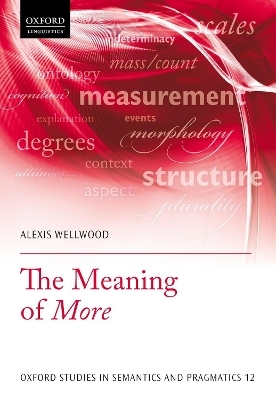
The Meaning of More
Seiten
2019
Oxford University Press (Verlag)
978-0-19-880465-9 (ISBN)
Oxford University Press (Verlag)
978-0-19-880465-9 (ISBN)
This book examines the semantics of comparative constructions using words such as more, as, too, and so on, and proposes a new account that rejects a fundamental assumption of the degree semantics framework. The findings have implications not only for semantics but also for language acquisition and cognitive science more broadly.
This book reimagines the compositional semantics of comparative sentences using words such as more, as, too, and others. The book's central thesis entails a rejection of a fundamental assumption of degree semantic frameworks: that gradable adjectives like tall lexicalize functions from individuals to degrees, i.e., measure functions.
Alexis Wellwood argues that comparative expressions in English themselves introducemeasure functions; this is the case whether that morphology targets adjectives, as intaller or more intelligent; nouns, as in more coffee, more coffees; verbs, such as run more, jump more; or expressions of other categories. Furthermore, she suggests that expressions that comfortably and meaningfully appear in the comparative form should be distinguished from those that do not in terms of a general notion of "measurability": a measurable predicate has a domain of application with non-trivial structure. This notion unifies the independently motivated distinctions between, for example, gradable and non-gradable adjectives, mass and count nouns, singular and plural noun phrases, and telic and atelic verb phrases. Based on careful examination of the distribution of dimensions for comparison within the class of measurable predicates, she ties the selection of measure functions to the specific nature and structure of the domain entities targeted for measurement.
The book ultimately explores how, precisely, we should understand semantic theories that invoke the "nature" of domain entities: does the theory depend for its explanation on features of metaphysical reality, or something else? Such questions are especially pertinent in light of a growing body of research in cognitive science exploring the understanding and acquisition of comparative sentences.
This book reimagines the compositional semantics of comparative sentences using words such as more, as, too, and others. The book's central thesis entails a rejection of a fundamental assumption of degree semantic frameworks: that gradable adjectives like tall lexicalize functions from individuals to degrees, i.e., measure functions.
Alexis Wellwood argues that comparative expressions in English themselves introducemeasure functions; this is the case whether that morphology targets adjectives, as intaller or more intelligent; nouns, as in more coffee, more coffees; verbs, such as run more, jump more; or expressions of other categories. Furthermore, she suggests that expressions that comfortably and meaningfully appear in the comparative form should be distinguished from those that do not in terms of a general notion of "measurability": a measurable predicate has a domain of application with non-trivial structure. This notion unifies the independently motivated distinctions between, for example, gradable and non-gradable adjectives, mass and count nouns, singular and plural noun phrases, and telic and atelic verb phrases. Based on careful examination of the distribution of dimensions for comparison within the class of measurable predicates, she ties the selection of measure functions to the specific nature and structure of the domain entities targeted for measurement.
The book ultimately explores how, precisely, we should understand semantic theories that invoke the "nature" of domain entities: does the theory depend for its explanation on features of metaphysical reality, or something else? Such questions are especially pertinent in light of a growing body of research in cognitive science exploring the understanding and acquisition of comparative sentences.
Alexis Wellwood is Assistant Professor of Philosophy and Linguistics at the University of Southern California, as well as the creative force behind the USC School of Philosophy's Meaning Lab. Her research and teaching focuses on the nature of linguistic meaning, in particular the interplay between morphosyntactic structure and nonlinguistic cognition in determining meaning. This research has been influential in linguistic semantics, language acquisition, philosophy of language, cognitive psychology, and computer science.
1: Introduction
2: Measurement and degrees
3: Measuring stuff and process
4: Measuring states
5: Measuring pluralities
6: Measuring occasions
7: Measuring accuracy
8: The limiting theory
9: Beyond semantics
References
Index
| Erscheinungsdatum | 27.11.2019 |
|---|---|
| Reihe/Serie | Oxford Studies in Semantics and Pragmatics ; 12 |
| Verlagsort | Oxford |
| Sprache | englisch |
| Maße | 176 x 254 mm |
| Gewicht | 578 g |
| Themenwelt | Geisteswissenschaften ► Philosophie ► Sprachphilosophie |
| Geisteswissenschaften ► Sprach- / Literaturwissenschaft ► Sprachwissenschaft | |
| ISBN-10 | 0-19-880465-2 / 0198804652 |
| ISBN-13 | 978-0-19-880465-9 / 9780198804659 |
| Zustand | Neuware |
| Haben Sie eine Frage zum Produkt? |
Mehr entdecken
aus dem Bereich
aus dem Bereich
Aspekte einer Ontologie des Logos
Buch | Hardcover (2024)
Springer Fachmedien (Verlag)
CHF 167,95
Wie die Menschheit zu ihrer größten Erfindung kam
Buch | Softcover (2022)
C.H.Beck (Verlag)
CHF 25,20
Macht und Legitimität politischer Sprache im Prozess der europäischen …
Buch | Softcover (2023)
Nomos (Verlag)
CHF 103,60


